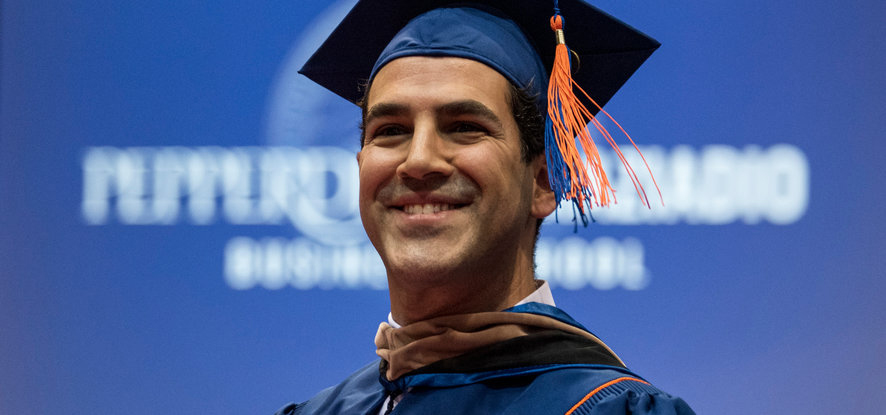Pursue Your Executive MBA: Program Admission

If you want to advance in your career, an Executive MBA (EMBA) is a great way to elevate your professional skills and stand out in a competitive job market. Pepperdine University's Graziadio Business School offers a 19-month EMBA program designed for seasoned executives and high-level managers looking to develop as leaders in the business world
This program provides business professionals with the skills to make data-based decisions and rise as visionary leaders in their fields. We'll walk you through how an Executive MBA can have a positive impact on your career, and provide you with an application checklist so you're well-prepared to enter the EMBA program at Pepperdine University.
Redefine Your Leadership. Drive Ethical Impact
Designed for accomplished leaders, the Executive MBA delivers strategic insight, global perspective, and the real-time application you need to lead at the highest level. Ranked as one of the best programs in the nation by Fortune Magazine, the Pepperdine EMBA empowers you to integrate your values with cutting-edge business strategy, shaping you into a leader of true influence.
Get in Touch
Fill out the Request Information form to learn about the opportunities that await you as a student at Pepperdine Graziadio.
Start Your Application
Ready to start your journey to Pepperdine Graziadio? Begin your application today to take the next step towards your future.
How Can an Executive MBA Help Your Career?
Whether you're shooting for a leadership role or eyeing a complete career change, an Executive MBA can help reshape your professional journey. Here are just a few ways this advanced degree program can help you get ahead.
- Leverage Professional Experience: If you already have a decent amount of professional experience under your belt, an Executive MBA helps you leverage that experience. It's the perfect way to deepen your understanding of business strategies and operations and turn your years on the job into a strong foundation for leadership roles.
- Gain Managerial Experience: Even if you've had some amount of managerial experience before, there's always room for growth. The EMBA program sharpens your ability to manage teams, budgets, and projects more efficiently, adding a distinguished skill set to your resume.
- Expand Your Career Options: An Executive MBA is a strong signal to employers that you're committed to your professional development and are equipped with the leadership skills needed for career advancement.
- Jumpstart a Career Transition: If you're contemplating a career transition, this degree can be your stepping stone. It equips you with a well-rounded business acumen that's highly transferable across industries.
- Become a Well-Rounded Business Professional: Beyond specific skills, the program shapes you into a well-rounded business professional. It covers everything from finance and marketing to ethics and leadership, making you versatile and valuable in business decision-making.

Pepperdine University’s EMBA Admissions Requirements
Securing a spot in this sought-after program requires that you're well-prepared and armed with everything you need to complete your application. Below, we'll break down everything you need to know about the admissions requirements for the EMBA program. From fine-tuning your resume to preparing for the interview, each step is an opportunity to show off your unique qualities and your potential as a future business leader.
Online Application
First, you'll need to complete the online application form. Make sure to be mindful of the application deadline, as late submissions can jeopardize your chances. The online form is often the first step in the application process, and it's essential that you submit a complete application to show that you're a serious and organized candidate.
Resume
You'll be required to submit a professional resume as part of your application. A compelling resume is more than listing job titles and responsibilities. Here are a few tips on how to make your resume stand out.
- Highlight your academic experience. Especially if you don't already have a ton of professional experience, your academic experience can be a strong testament to your analytical and cognitive skills. If you’ve conducted research, published papers, or achieved high honors, make sure these are visible and clearly laid out.
- Showcase your communication skills. Effective communication is key in any professional setting, especially at the managerial level. And a bullet point with "Possesses strong communication skills" isn't going to get the point across. Highlight instances where your communication skills made a difference—maybe you led a team meeting that resulted in a major win or you mediated a difficult conversation between stakeholders.
- Address any gaps in employment. Life happens, and sometimes that results in gaps in employment. Don't try to hide these; instead, address them directly and turn them into positives. Maybe you took time off to pursue professional certifications or to focus on personal development. Making this clear can give a complete picture of you as a well-rounded individual.
- Include your professional certifications: Contrary to popular belief, you shouldn't bury these at the bottom of your resume. Professional certifications and affiliations add credibility to your work history and could set you apart from other candidates.
- Clearly detail your professional history, without getting too far into the weeds. Your professional history shouldn't be a laundry list of roles you’ve held starting with your time working at the college bookstore when you were 19. Focus on achievements and responsibilities that directly relate to the skills needed in an Executive MBA program. Were you responsible for leading a team to exceed sales targets? Did you initiate a cost-saving project? Highlight these with quantifiable results.
- Include additional work experience where it's applicable. If you have freelance or volunteer experience that didn’t quite fit into your ‘main’ professional timeline but is relevant, don't leave it out. Additional work experience can provide another layer of depth to your resume. Maybe you consulted for a non-profit or volunteered as a treasurer for a local organization. This shows you're not just about the 9-to-5, but have broader interests and skills.
- Be sure to paint a complete picture of who you are as a professional. Use your resume as a tool to convey not just what you've done, but who you are—someone with a unique blend of academic and professional experiences, ready to take on the challenges of an Executive MBA program.
Bachelor’s Degree
You'll need to have completed your bachelor's degree from an accredited institution. This sets the academic baseline. Meeting this part of the EMBA admissions criteria is non-negotiable, as it assures the school that you have a basic level of education and analytical capability.
While the degree doesn't necessarily have to be in business, having an undergraduate degree related to the field is helpful when entering a specialized business program like an EMBA. Keep in mind that the admissions committee may closely evaluate the quality and rigor of your degree program to ensure you're well-prepared for the academic challenges ahead.
Official Transcripts
Along with your degree, you'll need to provide official transcripts (unofficial transcripts won't cut it). These should include grades for all your courses from your undergrad years. Transcripts offer a detailed look at your academic performance over an extended period. If you've attended an academic institution outside the U.S., make sure to provide international transcripts, which may need to be evaluated for equivalency.
Organizational Chart
An organizational chart helps the admissions team understand your role in your current company and how you interact with others. It paints a clearer picture of you as a team player or leader. Additionally, the chart can illustrate the complexity and scope of your responsibilities, showing that you're ready for executive-level challenges. It's a visual tool that complements the rest of your application, offering a quick but insightful glimpse into your professional world.
Personal Statement
The personal statement is your chance to shine on paper and show off who you are as a person. Discuss your career goals, why you’re interested in the EMBA program, and what you bring to the table. This is more than just another item on the checklist of application materials; it's an essential piece that can heavily influence the admissions decision. Here are some tips to keep in mind when crafting your personal statement:
- Be clear about your career plans. Don't be vague. Clearly outline your career trajectory and how the EMBA program fits into that path. This will demonstrate to the admissions committee that you’ve done your homework and understand the value of the degree in your career focus.
- Make yourself stand out from the applicant pool. Remember, you're not the only one applying for a spot in the program. Use the personal statement to differentiate yourself from the rest of the applicants. Talk about the unique experiences, skills, or perspectives you bring that will contribute to the learning environment.
- Keep it concise. While you may have a lot to say, try to deliver a concise statement that gets to the point while still being informative and compelling. A wordy essay can lose its punch and the reader's interest.
Letters of Recommendation
When it comes to recommendation letters, choose people who can speak to your skills, character, and suitability for the program. Ideally, consider asking your current supervisor, as they can offer a unique perspective on your leadership skills and professional performance. A direct supervisor's insights can serve as validation of your capabilities and add credibility to the other components of your application.
If you have someone who can vouch for your academic readiness—like a former professor or academic advisor—it can create a well-rounded view of you as both a professional and a scholar.
EMBA Admissions Interview
Once your application is in, you'll be contacted for an interview. This is a crucial step in the admission process, so make sure you are well-prepared. The interview provides the admissions committee with a chance to assess you beyond the paper application. This is where your interpersonal skills can really come into play. Being articulate, confident, and engaging during the interview can leave a lasting impression on the committee.
Think of the interview as the opportunity to bring your application to life and directly interact with those who will be making the admissions decision.
To maximize your chances for a successful interview, consider these tips:
- Do your research and make sure you're well prepared. Make sure you understand the program, its mission, and what makes it unique. make it clear that you aren't just applying to any program that will take you. Your ability to align yourself with the program’s goals can make you stand out.
- Practice, practice, practice. Practice really does make perfect. Rehearse answers to common questions, but be prepared to pivot. Sometimes an interview can go in unexpected directions.
- Know your application materials inside and out. Be prepared to dive deeper into any aspect of your application the committee may ask about, whether it's your experience, your goals, or even gaps in your work history.
- Dress to impress. First impressions matter, so make sure you dress appropriately for the interview, whether it's in-person or virtual.
- Make sure to follow u. After the interview, sending a thank-you email not only shows your appreciation but also reaffirms your interest in the program.
TOEFL, PTE, IELTS Scores (If Necessary)
For international applicants or those who didn't complete their education in English, language test scores may be required. This part of the application process ensures your English skills are proficient enough to fully engage with the curriculum. If English isn't your native language, consider these tests as an opportunity to demonstrate your capability to succeed in an academic setting where English is the language of instruction.

Can You Get Financial Aid For an Executive MBA Program?
Yes, financial aid is often available for Executive MBA programs, including the one at Pepperdine University’s Graziadio Business School. Financial aid can come in various forms, including federal loans, private student loans, and scholarships. Federal loans are typically accessible to U.S. citizens or permanent residents and can cover a significant portion of your educational costs. Private loans can also be an option, although the terms may vary compared to federal loans.
Earn Your Executive MBA From Pepperdine University
Pepperdine University's EMBA program offers more than just a degree. It’s an enriching experience that can take your career to the next level and position you as a visionary leader in your field.
When you submit your application for your EMBA admission, you're telling the world you're ready to step up your professional game. The program offers you the chance to learn from world-class faculty and network with accomplished professionals across various industries. It will push you to expand your capabilities, all while getting you ready for the challenges of modern business.
Don't just look at this as another box to check in your career path—see it as an investment in your professional and personal development. Get started today by submitting your online application.
Redefine Your Leadership. Drive Ethical Impact
Designed for accomplished leaders, the Executive MBA delivers strategic insight, global perspective, and the real-time application you need to lead at the highest level. Ranked as one of the best programs in the nation by Fortune Magazine, the Pepperdine EMBA empowers you to integrate your values with cutting-edge business strategy, shaping you into a leader of true influence.
Get in Touch
Fill out the Request Information form to learn about the opportunities that await you as a student at Pepperdine Graziadio.
Start Your Application
Ready to start your journey to Pepperdine Graziadio? Begin your application today to take the next step towards your future.